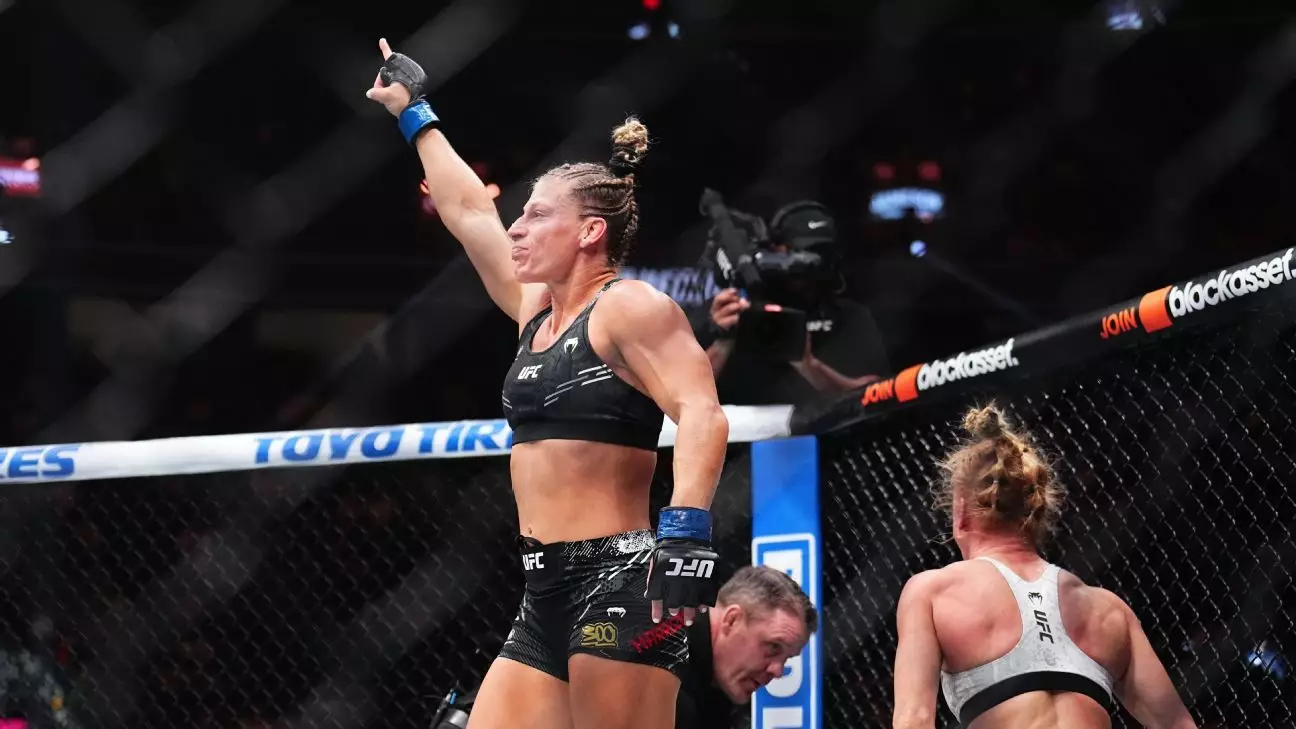In the world of mixed martial arts (MMA), the journey to the top is rarely a straight line. For Kayla Harrison, the No. 3-ranked women’s bantamweight in the UFC, her path to greatness is clouded with both anticipation and criticism. Scheduled to face Ketlen Vieira at UFC 307 on October 5, the stakes have never been higher for her. The bout not only serves as a critical juncture in her burgeoning UFC career but also as a potential gateway to vie for the 135-pound championship belt later that night, where Raquel Pennington will defend her title against Julianna Peña.
Despite being relatively new to the UFC, having had just one fight prior to this match, Harrison has garnered considerable attention. Critics, including Peña and Pennington, have accused her of “skipping the line” for a title opportunity. Such remarks betray a certain vulnerability in the existing champion circle, as they underscore the fear that a rising contender like Harrison could disrupt their established dominance. This situation highlights a broader theme in competitive sports: when one athlete threatens the status quo, those in power often resort to diversionary tactics—namely, attacking the character or integrity of the challenger.
Peña’s allegations concerning Harrison’s alleged use of performance-enhancing drugs have been particularly damaging. The former champion claimed in a recent interview that there is “no question” Harrison has taken steroids. However, Harrison has vehemently denied any previous or present claims of using such substances, framing these accusations as a projection of Peña’s insecurities. “I consider it a compliment,” Harrison remarked during an interview with ESPN, emphasizing that Peña’s claims stem from jealousy and a lack of self-belief.
This response showcases a fascinating dynamic in Harrison’s mindset—she transforms negative energy aimed at her into fuel for motivation. By reframing the narrative, Harrison shows remarkable resilience. Athletes often face scrutiny, particularly women in combat sports, where accusations of unfair advantages can linger. Yet, Harrison’s ironclad confidence in her training and natural abilities highlights an unwavering commitment to excellence without shortcuts.
One of the most compelling aspects of Harrison’s defense against the allegations is her commitment to transparency. She has disclosed that she is among the most tested athletes in the UFC, having undergone ten drug tests this year alone—this being the highest number among female fighters. The UFC’s anti-doping program, regulated by USADA, ensures rigorous monitoring, which Harrison openly speaks about.
“I think people forget that the first time I was tested by the USADA, I was just 12 years old,” she detailed, reinforcing her longstanding adherence to a clean athletic career. Her advocacy for clean sport resonates strongly, particularly in a field where performance enhancement can have severe consequences not just for those involved but for the integrity of the sport itself.
Harrison has built her identity around hard work, an attribute that truly sets her apart in a sport typified by sacrifice and dedication. Her journey began when she was just a child, training in judo and steadily rising through the ranks. The grit she possesses today is rooted in years of discipline and commitment. “I have worked my ass off since I was 12 years old, and I’m proud,” she stated, a sentiment that serves not just as a personal mantra but also as an inspiration for aspiring athletes.
As she prepares for her fight against Vieira, Harrison embodies the quintessential athlete: one who is both physically formidable and mentally resilient. Regardless of the outcome, the obstacles she has faced only serve to fortify her resolve. As she gears up for UFC 307, the world watches to see if she can convert this moment into a stepping stone towards championship glory.
Harrison’s narrative is not merely one of athletic prowess but of enduring strength. By confronting criticism with a blend of poise and ferocity, she not only sets a precedent for herself but also carves a path for future generations of female fighters. Whether she ascends to the championship belt or not, her legacy will be one rooted in authenticity and unwavering dedication.


Leave a Reply